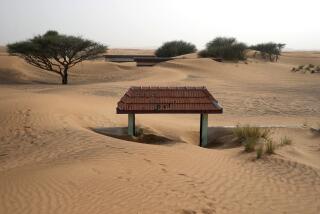Kuwait’s Animals Suffer in War’s Wake : Nature: With its human needs so pressing, the emirate lacks the resources to save wildlife decimated by the conflict.
- Share via
KUWAIT CITY, Kuwait — Rotting carcasses of Holstein cows litter a roadside, the victims of cluster bombs. The oil-blackened remains of gulls rest nearby. A once-powerful Arabian racehorse’s ribs show, a leg wound drawing flies.
War, starvation and ecological disasters have decimated Kuwait’s animal population. With human needs so pressing, the emirate lacks the food and manpower to save the animals that remain.
In the city streets, scrawny stray cats pick through mounds of fetid garbage. Camels and sheep have sticky black coats from the residue of hundreds of oil-well fires.
“So far, it’s been very frustrating because there’s no food available, and the government just doesn’t care,” said John Walsh, assistant director general of the Boston-based World Society for the Protection of Animals. “The Iraqis caused the problems, but the Kuwaitis are going to have to make an effort if they want to solve it.”
But some of the problems are clearly beyond anyone’s control.
On farms in the Sulaibiya district outside Kuwait city, dozens of dead gulls, their feathers covered in oil, are scattered in a sandy patch a few hundred yards long. Thousands more birds have died as a result of oil spilled in the Persian Gulf’s waters.
Amid the suffering and death, there has been one success story.
Walsh has scrambled to find food and volunteers to save the handful of the 442 animals at the Kuwait zoo that survived the Iraqi occupation.
Seven monkeys, five lions, three Syrian brown bears, two tigers, two water buffalo, a giraffe and a hippo were all near death when Walsh arrived.
He has driven back and forth to Saudi Arabia to buy barley, apples, dates, and also has relied on U.S. soldiers who bring table scraps. He blends straw with corn mix, and the animals devour it.
U.S. and British soldiers have used a mine detector to establish the location of a bullet wound in the shoulder of Azizor, the elephant, and surgery is likely to follow. A Syrian brown bear and a monkey also are scheduled for treatment for bullet wounds.
A green vervet monkey gave birth 10 days ago, the first addition to the zoo since the Iraqis left.
When his volunteers leave for the day, Walsh lets many of the less dangerous animals out of their cages to mingle for the night.
At first he slept among them, but the giraffe proved too playful.
“He wouldn’t stop licking my face; it drove me inside,” said Walsh.
More to Read
Sign up for Essential California
The most important California stories and recommendations in your inbox every morning.
You may occasionally receive promotional content from the Los Angeles Times.













